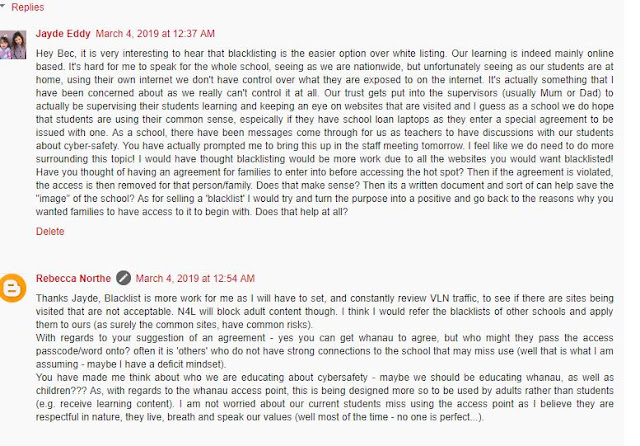Week 28 - Act in Your Professional Environment (Take Action)
To what extent does gamification impact on behavioural engagement for distance learners?
I am continuing to use Rolfe's Reflective model (n.d) to reflect this week.What?
I have identified that I do have an ethical issue that potentially could be a problem if it were to arise. The data that I collect on a weekly basis, from our online learning platform, does have the students name on it, however, for my inquiry purposes my students and their supervisors were told their identity would remain anonymous throughout it. I need to make sure that throughout my inquiry, anything that is written down does not and cannot identify the students directly.
So What?
For this part I have chosen to use Connecticut’s Teacher Education and Mentoring Program (2015) framework:
What possible issues/concerns might this scenario raise?
This scenario could raise a breach of privacy issue.
How could this situation become a violation of the law, the “Code” or other school policies?
This possible breach of privacy can be a direct violation of the Privacy Act 1993, which as a school Te Kura abides by and also these Teaching codes:
- Commitment to the Teaching Profession- contributing to a professional culture that supports and upholds this Code.
- Commitment to the Learner- promoting the wellbeing of learners and protecting them from harm.
- Commitment to Society-promoting and protecting the principles of human rights, sustainability, and social justice.
In this situation, what are some potentially negative consequences for the teacher, for the students and the school community?
- Having a breach of privacy may impact upon my professional practice and teaching and also the school
- Legal action pursued
- The community may lose confidence in their trust of educators in their school system.
What responses/actions will result in a more positive outcome and/or what proactive measures might be considered?
- recognising this as an issue
- seeking advice from my mentors and other experienced members of staff to discuss privacy and how I can make sure it is upheld, especially when transferring information from our weekly data learning portal.
- Staying proactive and making sure that there is nothing that will directly identify anyone.
Now What?
These were the teaching codes that I felt could be potentially violated if a student was identified in my inquiry, which are from our Education Council (2017):
- Commitment to the Teaching Profession- contributing to a professional culture that supports and upholds this Code.
- Commitment to the Learner- promoting the wellbeing of learners and protecting them from harm.
- Commitment to Society-promoting and protecting the principles of human rights, sustainability, and social justice.
References:
Connecticut’s Teacher Education and Mentoring Program. (2015). Ethical and Professional Dilemmas for Educators: Facilitator’s Guide: Understanding the Code of Professional Responsibility for Educators. Connecticut, US: Author. Retrieved from http://portal.ct.gov/-/media/SDE/TEAM/Module_5_Supplemental_Scenarios-Facilitator_Guide_January_2015.pdf?la=en
Education Council. (2017a). Our Code Our Standards.Retrieved from: https://educationcouncil.org.nz/sites/default/files/Our%20Code%20Our%20Standards%20web%20booklet%20FINAL.pdf
Otago Polytechnic. (n.d.). Reflective Writing. Retrieved from https://www.op.ac.nz/assets/LearningAdvice/Reflective-writing.pdf

Comments
Post a Comment